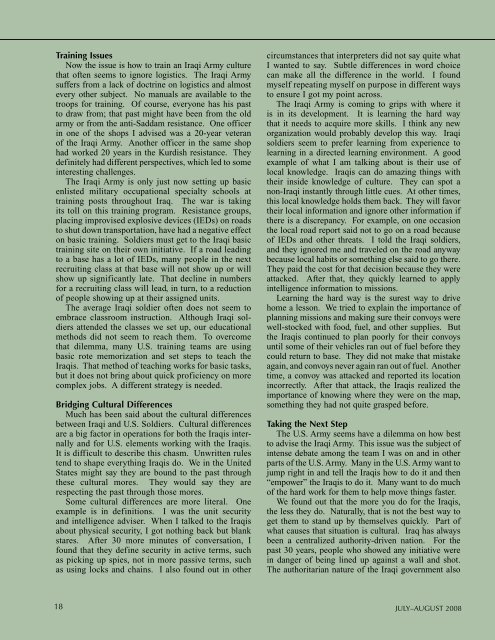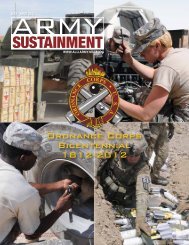Do Stryker Brigade Combat Teams Need Forward Support ...
Do Stryker Brigade Combat Teams Need Forward Support ...
Do Stryker Brigade Combat Teams Need Forward Support ...
You also want an ePaper? Increase the reach of your titles
YUMPU automatically turns print PDFs into web optimized ePapers that Google loves.
Training Issues<br />
Now the issue is how to train an Iraqi Army culture<br />
that often seems to ignore logistics. The Iraqi Army<br />
suffers from a lack of doctrine on logistics and almost<br />
every other subject. No manuals are available to the<br />
troops for training. Of course, everyone has his past<br />
to draw from; that past might have been from the old<br />
army or from the anti-Saddam resistance. One officer<br />
in one of the shops I advised was a 20-year veteran<br />
of the Iraqi Army. Another officer in the same shop<br />
had worked 20 years in the Kurdish resistance. They<br />
definitely had different perspectives, which led to some<br />
interesting challenges.<br />
The Iraqi Army is only just now setting up basic<br />
enlisted military occupational specialty schools at<br />
training posts throughout Iraq. The war is taking<br />
its toll on this training program. Resistance groups,<br />
placing improvised explosive devices (IEDs) on roads<br />
to shut down transportation, have had a negative effect<br />
on basic training. Soldiers must get to the Iraqi basic<br />
training site on their own initiative. If a road leading<br />
to a base has a lot of IEDs, many people in the next<br />
recruiting class at that base will not show up or will<br />
show up significantly late. That decline in numbers<br />
for a recruiting class will lead, in turn, to a reduction<br />
of people showing up at their assigned units.<br />
The average Iraqi soldier often does not seem to<br />
embrace classroom instruction. Although Iraqi soldiers<br />
attended the classes we set up, our educational<br />
methods did not seem to reach them. To overcome<br />
that dilemma, many U.S. training teams are using<br />
basic rote memorization and set steps to teach the<br />
Iraqis. That method of teaching works for basic tasks,<br />
but it does not bring about quick proficiency on more<br />
complex jobs. A different strategy is needed.<br />
Bridging Cultural Differences<br />
Much has been said about the cultural differences<br />
between Iraqi and U.S. Soldiers. Cultural differences<br />
are a big factor in operations for both the Iraqis internally<br />
and for U.S. elements working with the Iraqis.<br />
It is difficult to describe this chasm. Unwritten rules<br />
tend to shape everything Iraqis do. We in the United<br />
States might say they are bound to the past through<br />
these cultural mores. They would say they are<br />
respecting the past through those mores.<br />
Some cultural differences are more literal. One<br />
example is in definitions. I was the unit security<br />
and intelligence adviser. When I talked to the Iraqis<br />
about physical security, I got nothing back but blank<br />
stares. After 30 more minutes of conversation, I<br />
found that they define security in active terms, such<br />
as picking up spies, not in more passive terms, such<br />
as using locks and chains. I also found out in other<br />
18<br />
circumstances that interpreters did not say quite what<br />
I wanted to say. Subtle differences in word choice<br />
can make all the difference in the world. I found<br />
myself repeating myself on purpose in different ways<br />
to ensure I got my point across.<br />
The Iraqi Army is coming to grips with where it<br />
is in its development. It is learning the hard way<br />
that it needs to acquire more skills. I think any new<br />
organization would probably develop this way. Iraqi<br />
soldiers seem to prefer learning from experience to<br />
learning in a directed learning environment. A good<br />
example of what I am talking about is their use of<br />
local knowledge. Iraqis can do amazing things with<br />
their inside knowledge of culture. They can spot a<br />
non-Iraqi instantly through little cues. At other times,<br />
this local knowledge holds them back. They will favor<br />
their local information and ignore other information if<br />
there is a discrepancy. For example, on one occasion<br />
the local road report said not to go on a road because<br />
of IEDs and other threats. I told the Iraqi soldiers,<br />
and they ignored me and traveled on the road anyway<br />
because local habits or something else said to go there.<br />
They paid the cost for that decision because they were<br />
attacked. After that, they quickly learned to apply<br />
intelligence information to missions.<br />
Learning the hard way is the surest way to drive<br />
home a lesson. We tried to explain the importance of<br />
planning missions and making sure their convoys were<br />
well-stocked with food, fuel, and other supplies. But<br />
the Iraqis continued to plan poorly for their convoys<br />
until some of their vehicles ran out of fuel before they<br />
could return to base. They did not make that mistake<br />
again, and convoys never again ran out of fuel. Another<br />
time, a convoy was attacked and reported its location<br />
incorrectly. After that attack, the Iraqis realized the<br />
importance of knowing where they were on the map,<br />
something they had not quite grasped before.<br />
Taking the Next Step<br />
The U.S. Army seems have a dilemma on how best<br />
to advise the Iraqi Army. This issue was the subject of<br />
intense debate among the team I was on and in other<br />
parts of the U.S. Army. Many in the U.S. Army want to<br />
jump right in and tell the Iraqis how to do it and then<br />
“empower” the Iraqis to do it. Many want to do much<br />
of the hard work for them to help move things faster.<br />
We found out that the more you do for the Iraqis,<br />
the less they do. Naturally, that is not the best way to<br />
get them to stand up by themselves quickly. Part of<br />
what causes that situation is cultural. Iraq has always<br />
been a centralized authority-driven nation. For the<br />
past 30 years, people who showed any initiative were<br />
in danger of being lined up against a wall and shot.<br />
The authoritarian nature of the Iraqi government also<br />
JULY–AUGUST 2008







